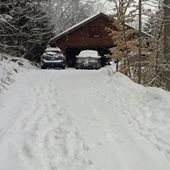When you live in northeast Wisconsin, and run the upper mid west, winter storms are inevitable. How 
 we receive our information has evolved. The weather forecasters have gotten more accurate. We have satellite radio. Overhead electronic signs give us current information. We need to combine modern sources with old school techniques and common sense.
we receive our information has evolved. The weather forecasters have gotten more accurate. We have satellite radio. Overhead electronic signs give us current information. We need to combine modern sources with old school techniques and common sense.
The day before the storm hit had been a good one. I camped at our customer near Madison, WI Monday night. They had me unloaded around 07:00. My pick up was scheduled to be a live load in Kaukauna, WI. It was setting me up to hit the beginning of Chicago's afternoon rush. The trailer was preloaded. That saved about 90 minutes, and helped me sail through Chicago before the afternoon rush. I made it to Brookville, OH for my 10 hour break. I like stopping there because there is a trail near the truck parking.
After my morning walk, I checked my fleet management system. There was already talk of road closures on I65 in northern IN. I was already thinking about where I would spend the night. The wisest thing to do is shut down well before the storm. My plan had been to make it through Chicago. My delivery in Lancaster, OH went fine. So did my pick up in Cincinnati. Almost every load that I haul is over 40,000 pounds. This one did not even register on my axle gauge. It was 55f in Cincinnati. That gave me some hope, but the temperature had dropped to 32 by the time I got to Indy. When I got to Indy, the rain had changed to snow.
 My plan had been to hit the IL line about 19:00 and breeze through Chicago. They wanted my load in Neenah, WI by 13:00 on Thursday. There are truck stops north of Indianapolis and I was thinking about stopping there. I probably should have. The weather had not turned too bad. The worst of the storm was
My plan had been to hit the IL line about 19:00 and breeze through Chicago. They wanted my load in Neenah, WI by 13:00 on Thursday. There are truck stops north of Indianapolis and I was thinking about stopping there. I probably should have. The weather had not turned too bad. The worst of the storm was
north of Lafayette. I listened to Mark Willis on the Road Dog. Then I switched over to Indianapolis AM for more local information. Electronic overhead signs were also feeding me information. My radio plan was to switch to Lafayette AM and then to the ultimate Chicago information on WBBM 780 AM out of Chicago. Listen to your CB. You still get good first hand information there.
switch to Lafayette AM and then to the ultimate Chicago information on WBBM 780 AM out of Chicago. Listen to your CB. You still get good first hand information there.
Another source of information is the flow of traffic going the other way. If there is no traffic. There is something bad ahead. CB reports were telling us that there was a bad accident at the 230 mile marker. I called it a night at the 215. It just was no longer worth it. I took my 10 hour break there. The next morning was bad, but not too bad. We saw a video of cars and trucks stranded on route 2 near the 240 mile marker. It is a bad idea to go around a weather related closure on the interstate. No load is that important. It is always better to shut down too early than too late. That way you can relax at home.